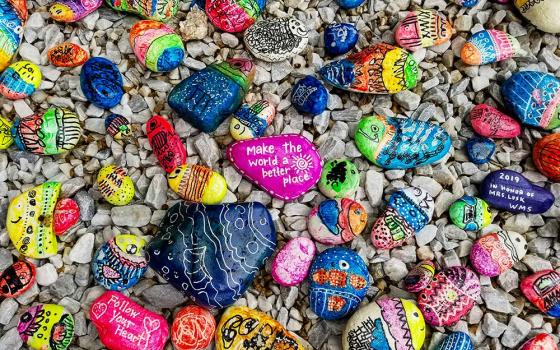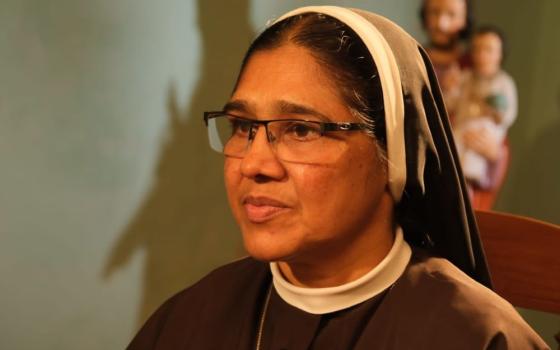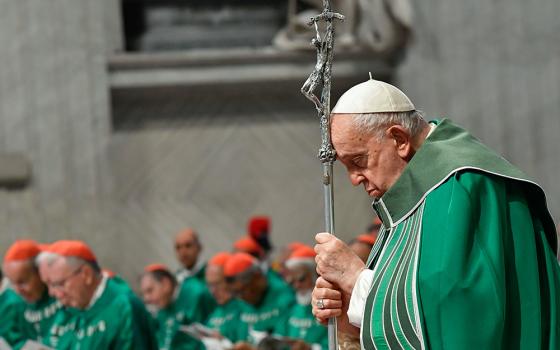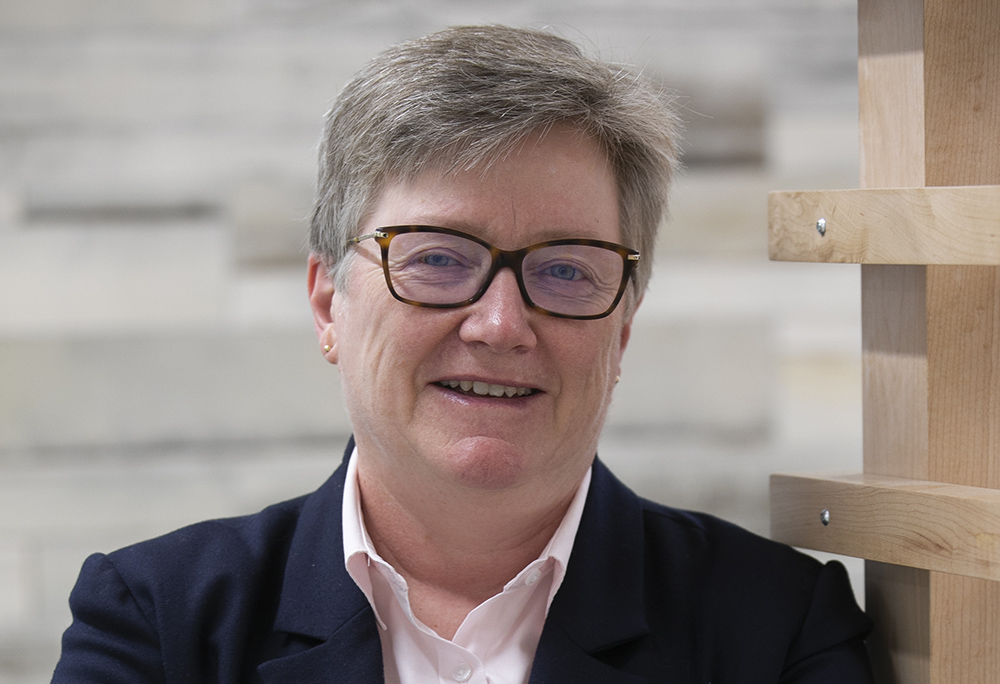
Catherine Clifford, a professor at St. Paul University in Ottawa, Ontario, and a voting member of the Synod of Bishops on synodality (Courtesy of St. Paul University)
One of the voting members of Pope Francis' hotly anticipated Synod of Bishops on synodality has indicated an openness to restoring the early Catholic Church's tradition of ordaining women as deacons.
Catherine Clifford, a noted historian and theologian who is part of the first group of laypeople ever appointed as full members of the synod, told NCR that the consensus of the two-year consultation process leading to the synodal assembly made clear "the pain and the woundedness" of many women who feel their work serving the church is not being recognized.
"We need to have that conversation of: Look, so many women are doing diaconal tasks," said the academic. "Is this not a moment to consider a restoration of women's diaconal ministries?"
Clifford, a professor at St. Paul University in Ottawa, Ontario, spoke in a Sept. 30 interview for The Vatican Briefing, a new podcast from NCR. The podcast, which features Vatican experts Joshua J. McElwee and Christopher White, is being released weekly during the Oct. 4-29 synod at the Vatican.
Following is an excerpt of Clifford's interview for The Vatican Briefing, which also discussed LGBTQ Catholics' hopes for the synod, the wider implications of Francis' new process for the assembly, and how the church might reexamine its structures of governance. The excerpt has been edited for length and clarity.
McElwee: How does it feel to be one of the first ever lay members of the synod? How does that resonate for you?
Clifford: It's pretty remarkable. I have to pinch myself every once in a while, because this is something I never could have imagined seeing in my lifetime. I spent some time after I was invited to be here over the summer months in prayer and retreat, and I come here with a sense of deep gratitude and peace.
This is clearly a historic moment. But it's a very essential moment for the future of the church. And I feel quite honored to be here.
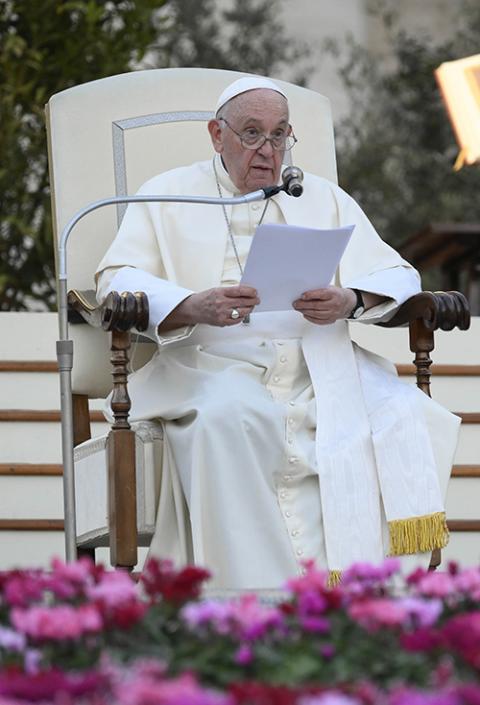
Pope Francis gives his homily during an ecumenical prayer vigil ahead of the assembly of the Synod of Bishops in St. Peter's Square at the Vatican Sept. 30. (CNS/Vatican Media)
White: Beyond yourself, how significant would you say this is in terms of a historical development for Pope Francis to establish full voting members that are lay?
In the Western church, we have let synodal practice and culture die. I talk about these as being a set of muscles in the ecclesial body that were allowed to atrophy.
And when Francis indicated his intention to invite the whole Catholic world to just sit down and begin this conversation, and to take the baptized seriously also as part of the synodal process, I have to say I was a little skeptical. Because, I said, 'we have no experience of this.' He's taken a wager that we will learn to do this, in the doing. We learn by doing.
We know that we need to re-examine all the governing structures and practices of our church. What's weakest in Catholic practice has been the participation of the baptized. And this is not untraditional, this was a feature of life in the early church. And Vatican II invited us to rediscover the importance of our baptismal vocation.
I'm here as a baptized Christian. That's the basis of my mandate to participate. And I think that in itself is very important.
I've spent my life teaching in the field of ecclesiology, helping students understand the church — what it is, its structures and practices. But I want them to understand their dignity as baptized Christians. And, so, what we're doing is both reviving the collegial, synodal practice at every level of church life, but also adding that ingredient of lay participation, which is really fundamental.
It doesn't diminish, in any way, the oversight of the bishops. They take the authoritative decisions, but they historically must always consult competent persons and listen to the life of the faithful, because what they teach is essentially the faith of the whole church.
So, the whole church needs to be implicated in the process of that discernment. In a remarkable way, we're moving in that direction.
White: You talk about how this is a learning process. But there are high expectations for a lot of people about this synod, particularly when it comes to the role of women's ministry in the life of the church and LGBTQ issues. As a member, what is going through your mind in terms of expectations?
I think it's clear. There is a consensus from every continental region, that these are significant issues. I think what we hear is the pain and the woundedness: of many women who serve very generously, and whose gifts are not fully integrated into the life of the church; and of many families who have family members, colleagues, students, friends who belong to the LGBTQ community, and who've been also wounded by the attitudes and the language of the church's teaching.
I think we have to hear those voices. I don't think that the synod is intended to resolve any of those issues in a definitive way. But it needs to acknowledge the reality. And it sets the course for how we will face those questions going forward. I think that's the essential thing, so that the conversation remains open.
Advertisement
McElwee: Chris mentioned a couple of the issues that people are looking at the synod with expectation. I'm curious, are there particular issues that touch your heart, maybe that aren't among those most cited in this conversation, that you're bringing with you into the synod?
If you look at the working document, it's quite overwhelming. It's a massive agenda. I don't know what I could possibly add to it. But these questions of reexamining the ministries, the ministerial structure in the church, and the diversity of ministries in the church is a very important one. Understanding that in a synodal church, we need a style of leadership that's different.
There's a host of questions there. And I think it's in that question that we need to have that conversation of: Look, so many women are doing diaconal tasks. Is this not a moment to consider a restoration of women's diaconal ministries?
McElwee: Beyond the specific issues or expectations for what this synod might achieve, how do you consider this new synodal process, which involved a two-year consultation of Catholics around the world? Is there something in this that is changing the way the church operates?
I think it's remarkable. I don't think that another leader could have done it, who didn't have the experience of the Ignatian tradition. I think even the process of spiritual conversation that's being proposed here is the fruit of a long learning process by the Jesuits, who have been working to find more contemporary ways of living out the Spiritual Exercises of St. Ignatius of Loyola.
It's a lovely gift to the church. And I know other churches are watching us, because they, too, know that they may have synodal structures, but they may not always work in the best and most effective way.
It's a huge experiment. But I think it's a remarkable one. And there's a tremendous tradition of spiritual wisdom behind what we're going to embark upon.



